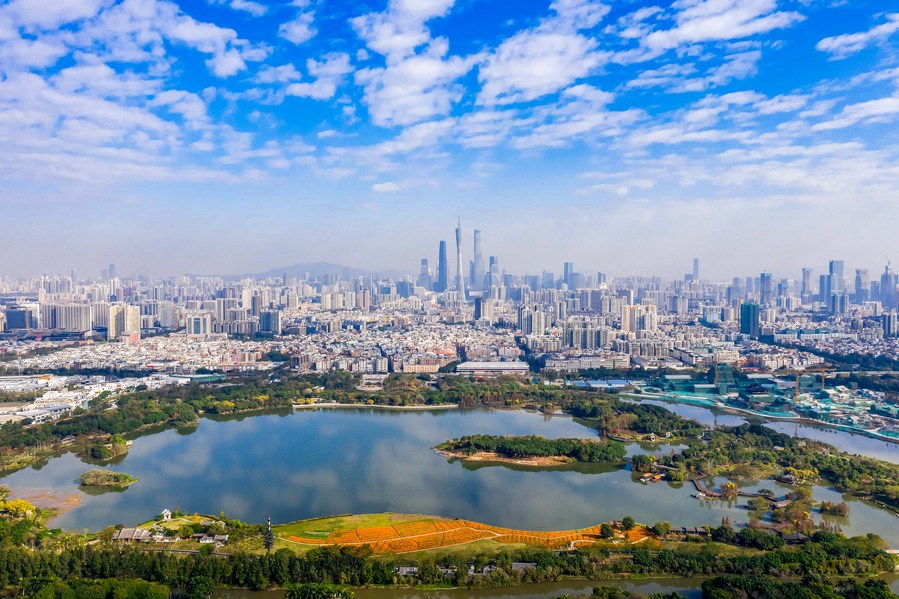
Aerial photo taken on Feb. 24, 2020 shows the Haizhu wetland and the Canton Tower in the distance in Guangzhou, south China's Guangdong Province. (Photo by Xie Huiqiang/Xinhua)
by Xinhua writers Ye Ting, Ma Xiaocheng, Xiong Jiayi
GUANGZHOU, Sept. 29 (Xinhua) -- It takes residents of Foshan City less than an hour to reach their workplaces in the southern Chinese metropolis of Guangzhou, thanks to the intercity subway that extraordinarily facilitates the daily commute.
Approximately 255,000 passengers commute daily between the two cities via subway, accounting for 14 percent of the total number of daily commuters. The Guangzhou-Foshan Line is the first intercity metro line in China, with an average daily passenger volume of about 531,000, said Zhang Jian, an official with the Guangzhou Metro Group Co., Ltd.
While meeting the travel needs of commuters, the intercity subway line also plays an important role in the social and economic integration of Guangzhou and Foshan, with 18.8 million and 9.6 permanent residents, respectively.
Both cities are both located in the core area of the Pearl River Delta in Guangdong, featuring close economic ties and cultural similarities. The GDP of the two cities exceeded 4 trillion yuan (about 563 billion U.S. dollars) in 2021, accounting for more than 32 percent of the entire province.
In August, the two cities jointly issued a plan to push for further integration during the 14th five-year plan period (2021-2025). It stated that by 2025, the combined GDP of the two cities should reach 5 trillion yuan and the commute time between their downtown areas would be reduced to 30 minutes.
The Baiyun Lake Digital Technology City is located in the western part of Guangzhou's Baiyun District, across the river from the Nanhai District in Foshan.
The tech city is dedicated to fostering the digital economy and propelling the digital transformation of the traditional industries, such as leather goods, cosmetics, furniture and equipment production.
"Utilizing geographical advantages, we will strengthen industrial collaboration between Guangzhou and Foshan, as well as promote the digital economy's growth and green, low-carbon development," said Zhang Min, deputy director of the service and management center of the Baiyun Lake Digital Technology City.
The industrial clusters have injected vigor into the regional economy, and the business environment has been steadily improving.
Guangzhou and Foshan have established a mechanism in August 2020 allowing their citizens to access government service of the other city without traveling there. Documents are processed online or sent by mails.
The story of Guangzhou and Foshan has become a new paradigm of China's regional integration drive, noted an official with the Guangzhou municipal development and reform commission.




 A single purchase
A single purchase









